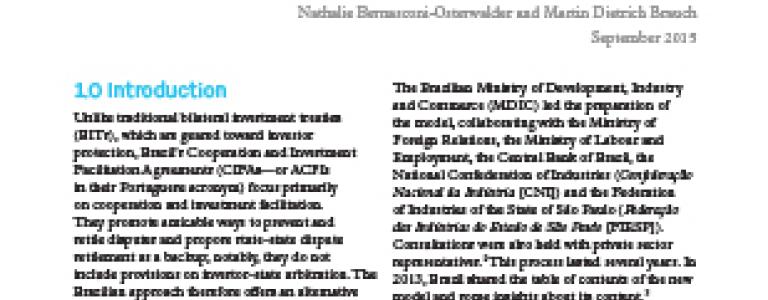Comparative Commentary to Brazil’s Cooperation and Investment Facilitation Agreements (CIFAs) with Mozambique, Angola, Mexico, and Malawi
Unlike traditional bilateral investment treaties (BITs), which are geared toward investor protection, Brazil’s Cooperation and Investment Facilitation Agreements (CIFAs—or ACFIs in their Portuguese acronym) focus primarily on cooperation and investment facilitation.
Unlike traditional bilateral investment treaties (BITs), which are geared toward investor protection, Brazil’s Cooperation and Investment Facilitation Agreements (CIFAs—or ACFIs in their Portuguese acronym) focus primarily on cooperation and investment facilitation.
They promote amicable ways to prevent and settle disputes and propose state–state dispute settlement as a backup; notably, they do not include provisions on investor–state arbitration. The Brazilian approach therefore offers an alternative to governments that wish to reduce unintended risks of arbitration while finding ways to settle disagreements that may arise with investors. This note compares the first four CIFAs concluded and provides an overview and a critical legal commentary of their texts, followed by suggestions and recommendations for existing and future CIFAs.
You might also be interested in
Building the Investment Case for Nature-Based Infrastructure
Nature-based infrastructure help increase societies' resilience to climate change and the insurance industry can play a key role.
Doubling Back and Doubling Down: G20 scorecard on fossil fuel funding
This study tracks, for the first time, each G20 country's progress on ending support for fossil fuels—ranking their transparency, commitments, and financial support to oil, gas, and coal.
Stabilization Clauses: The hidden provisions that can hinder tax and investment policy reform
Stabilization clauses should no longer automatically be included in contracts between states and investors. If they are, they should, at a minimum, build on the latest international standards on stabilization to avoid being a barrier to sustainable development.
What Drives Investment Policy-makers in Developing Countries to Use Tax Incentives?
The article explores the reasons behind the use of tax incentives in developing countries to attract investment, examining the pressures, challenges, and alternative strategies that exist.
